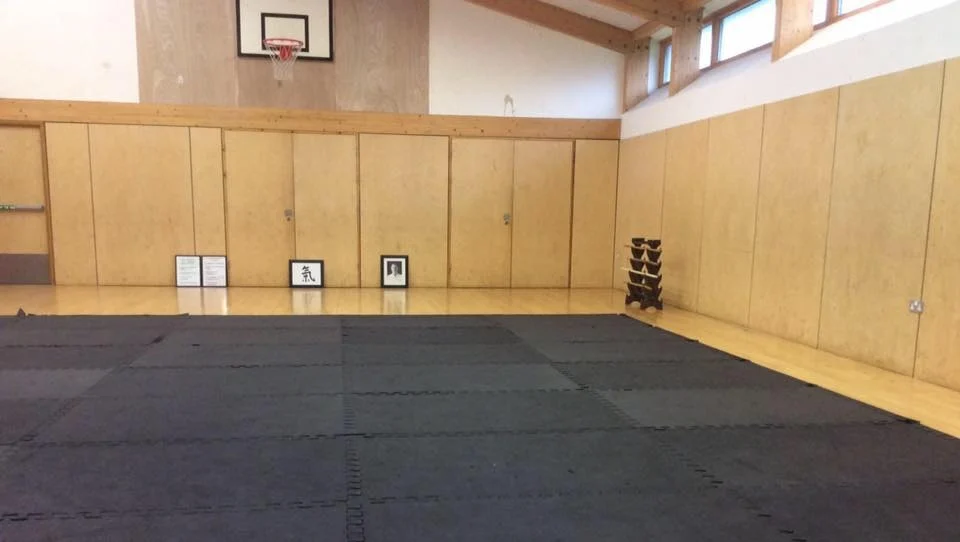Teacher:
Reg D'Souza
Teacher's Grade:
6th Dan
Phone:
07970 344 043
Email:
reg@dsouza.co.uk
Dojo:
Hendra Hall,
Carew Street
Truro
Cornwall
United Kingdom
TR1 3TP

We train upstairs in the Ray and Margaret Teague Room at Hendra Hall. If using the car park, please enter your car reg on the tablet in the hallway.
Beginners always welcome. We train on Tuesdays. It is advisable to call ahead to confirm that a class is running.
Ki Aikido
Ki Aikido is a Japanese art that explores and strengthens mind and body coordination, leading to a positive relaxation and greater calmness. Ki Aikido is non-competitive and does not directly teach self-defence – other than in the broadest sense of that term.
About the club
The club’s instructor is Sensei Reg D’Souza, who holds the rank of 6th Dan. He has taught for over 20 years, including at a junior and youth club at Kea School.
Who can attend:
Adults, teenagers 13 years and older.
12 year-olds can attend if accompanied by a parent or guardian.
Cost per session
Following receipt of membership fee there is no charge for the first session. Subsequent sessions cost £7 each on a pay as you go basis.
What to expect and what to do during your first Ki Aikido lesson
The club retains some traditional Japanese etiquette. And, as you will discover, these details exist for practical reasons.
What to wear
In Ki Aikido classes it is best to wear loose fitting clothing such as track suit bottoms and a T-shirt, avoid shorts and a vest top or any clothing with a metal fastenings.
If you have a Kidogi (Japanese training outfit) from other practices, you can wear that. Students train bare footed, so will not need anything on their feet.
Session structure
Students should arrive at the Dojo (place of practice) 15 minutes before the session starts. This gives us time to put out the mats and get changed.
Safe practice is a priority, so aim to be in a frame of mind that is focused and ready to train.
Once the mats are out, sit in grade order and wait quietly for the instructor to start the class. If you are able to kneel, kneel Japanese style (sitting seiza). Anyone who has difficulties sitting in this way can sit crossed-legged or on a chair just off the mat.
How the session starts
The instructor will step onto the mat and then, at his instigation, the whole class bow together to the front. This is symbolic mark of gratitude for having somewhere to learn
together and is the first opportunity for everyone to get in sync. The teacher then turns towards the students and the students and teacher bow to each other. This marks the formal start to the first half of the session.
We then warm up with some gentle stretching and run through a set of coordination exercises. These are together called Ki for health and Ki Development exercises. Once the session is underway, students usually train in pairs.
The instructor will help you with your positions and posture and will make corrections or suggestions as appropriate.
Some additional dojo etiquette
- Part of training is to show respect to the teacher, the fellow students, the dojo, and the session itself. This helps to focus the mind and create a good environment for training.
- Train safely – safe practice is a priority; this includes removing all jewellery and tying back long hair and keeping finger and toenails short (or taped if long nails are required – for example if you are a guitarist).
- Bow when entering or leaving the dojo;
- Bring a focused attitude to the mat and accept feedback from Sensei;
- Show respect to everyone you train with
- Ensure not to bring distractions into the dojo, e.g. phones are turned off, no chewing gum, etc;
- Follow instructions from Sensei quickly and respond to questions politely;
- Wait for an appropriate moment to ask questions;
- Train in clean and appropriate clothes;
- Walk to the mat wearing footwear (sandal or flip flops if you have any) and then remove these before stepping onto the mats to help keep the mats clean;
- Avoid general chat once the session has started;
- Ask Sensei first before leaving the mat.
If you have any questions please contact Sensei D’Souza by email or mobile (above).
